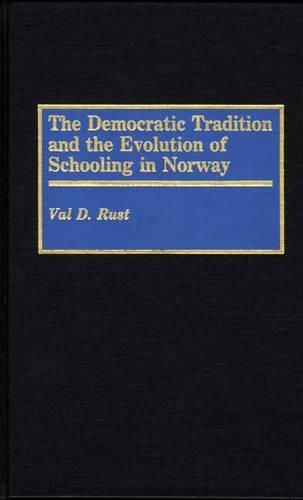
The Democratic Tradition and the Evolution of Schooling in Norway
(Hardback)
Publishing Details
The Democratic Tradition and the Evolution of Schooling in Norway
By (Author) Val Rust
Bloomsbury Publishing PLC
Praeger Publishers Inc
25th October 1989
United States
Classifications
Tertiary Education
Non Fiction
370.9481
Physical Properties
Hardback
347
Description
In this study of educational reform in Norway, Rust aims to isolate and define the historical forces that have moulded Norwegian school reform since the country gained its independence. The book examines the ways in which Norway was able to move from a traditional dualistic school structure to a more comprehensive and unified form that serves the country today. It focuses not only on the structural changes that occurred in primary and secondary schools, but also on the equality of educational opportunity and the issue of where control over education lies. The book begins with a survey of Norway's social and educational status at the time of its independence in 1814. The subsequent reforms are then discussed in terms of four cycles: the attempt to build a co-ordinated system of education, the building of a comprehensive school that would include large segments of the population, the attempt to legally strengthen the unity of the system following Norway's break from Sweden in 1905, and the experimentation with a compulsory basic school that led to the integrated schooling program of today. A final section considers the degree to which Norway has accomplished its goals and the radical move to shift control from the central to local governments. Already awarded the International Symbol for Norway's 250th anniversary of public education, the book will be a useful addition to academic and public libraries in the United States and Europe.
Reviews
. . . In sum, this is a thoroughly researched and very detailed account of the institutional methods used by a small, extremely homogeneous society in its process of creating an educational system appropriate to the maintenance of its widely accepted values of democracy and egalitarianism.-History of Education Quarterly
This worthwhile addition to a distinguished series fill what was an empty niche in the literature of comparative education. Rust is well versed in his topic by experience and study and presents the development of schooling in a full historical context from 1814, the date of independence, to the present. He describes the development of an open society and the parallel development of an educational system with a capacity to adapt ideas from abroad while at the same time having the capacity to develop a sense of genuine internal ownership of its reforms. . . .' Themes considered include the class structure of society and its treatment in school programs, rural-urban divisions, secularization and religion, development of a modern curriculum and the influence of classical studies, the introduction and growth of the vernacular, education of women, children with special needs, the admirable role of teachers and schools during the Quisling collaboration with the Nazis, school reform movements, and the adjustments for ethnic minorities. There are a number of helpful charts, a useful index, and an extensive bibliography (which is, however, mostly of Norwegian references). Upper-division undergraduate and above.-Choice
." . . In sum, this is a thoroughly researched and very detailed account of the institutional methods used by a small, extremely homogeneous society in its process of creating an educational system appropriate to the maintenance of its widely accepted values of democracy and egalitarianism."-History of Education Quarterly
"This worthwhile addition to a distinguished series fill what was an empty niche in the literature of comparative education. Rust is well versed in his topic by experience and study and presents the development of schooling in a full historical context from 1814, the date of independence, to the present. He describes the development of an open society and the parallel development of an educational system with a capacity to adapt ideas from abroad while at the same time having the capacity to develop a sense of genuine internal ownership of its reforms. . . .' Themes considered include the class structure of society and its treatment in school programs, rural-urban divisions, secularization and religion, development of a modern curriculum and the influence of classical studies, the introduction and growth of the vernacular, education of women, children with special needs, the admirable role of teachers and schools during the Quisling collaboration with the Nazis, school reform movements, and the adjustments for ethnic minorities. There are a number of helpful charts, a useful index, and an extensive bibliography (which is, however, mostly of Norwegian references). Upper-division undergraduate and above."-Choice
Author Bio
VAL D. RUST is Associate Professor of Education at UCLA, where he specializes in Comparative and International Studies in Education. He has also been a fellow for several years with IMTEC Institute in Oslo, Norway. He is the author of numerous articles, as well as the book Alternatives in Education, and the forthcoming Teachers and Teaching in the Developing World.
